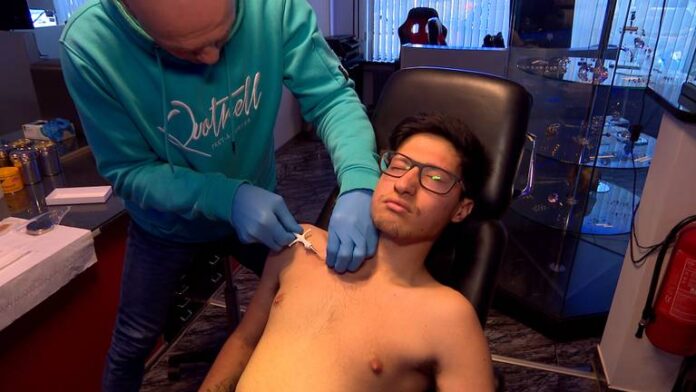A chip placed in your body with your medical information on it or a chip that you can pay with. It’s possible: a tattoo shop in Tilburg is the first in our country to do it.
But the resistance to it is huge. The reactions to it on social media are highly negative. Nevertheless, we should not be mistaken: this is really the future, says Maarten Steinbuch, professor at the Eindhoven University of Technology.
Steinbuch knows a lot about high-tech systems. He has expertise in new technology such as these implants. You can now have a chip the size of a grain of rice placed in your body in Tilburg, at the height of your collarbone. With that chip, you can measure your temperature and you can put your medical data on it. In the event of an accident the medics can immediately see what blood group you have.
A chip in your body or your telephone- what is the difference?
Many people fear for their privacy rights. Steinbuch doesn’t see a problem with this: “There is not much difference between a chip in your body and a smartphone in your back pocket. In both situations you have to consider your privacy. It is more about how you use your telephone or chip.”
According to Steinbuch, the real reluctance lies in the control you want to have over your own body: “You see that with corona vaccinations. There will always be a small group of five or ten percent that do not want to have it. It may be on the basis of conviction or belief. But the 95 percent who do want it must also have the freedom to do it.”
You should be able to determine whether you need it or not says Steinbuch. “It is just like you decide for yourself whether or not you want treatment at the doctor. Or euthanasia or not. That is a fundamental right of us as human beings.”
“Once a child is 18, they can decide themselves”
Steinbuch previously suggested the possibility of implanting a chip in your child. You can always monitor where they are. “I think that makes sense, because of safety. But your child should also be able to have such a chip removed and to be done without damage when they are 18.”
You have to be careful that you don’t favour people with a chip, says Steinbuch. “Suppose I can just walk through with my chip when I get on the train. Then other people should be able to use their phone to get on the train in the same way.”
Still, the resistance seems great. When Omroep Brabant brought the story about the medical chip last weekend, there were hundreds of negative reactions on Instagram: “Nooooit…. Sick world!!!!”
“Just ask all those people who commented: ‘You get heart problems, do you not want a pacemaker then, because you don’t want a chip in your body? Or imagine you go blind and it turns out that a chip can be implanted that allows you to see again. Do you want it or not?’”
Steinbuch thinks that the vast majority of people will opt for a chip: “We have been chipping our pets for a long time. When we started doing this twenty years ago, everyone thought: we have to. But the most important thing remains: everyone can decide for themselves.”
Source: Omroep Brabant
Translated by: Shanthi RamaniIt
















